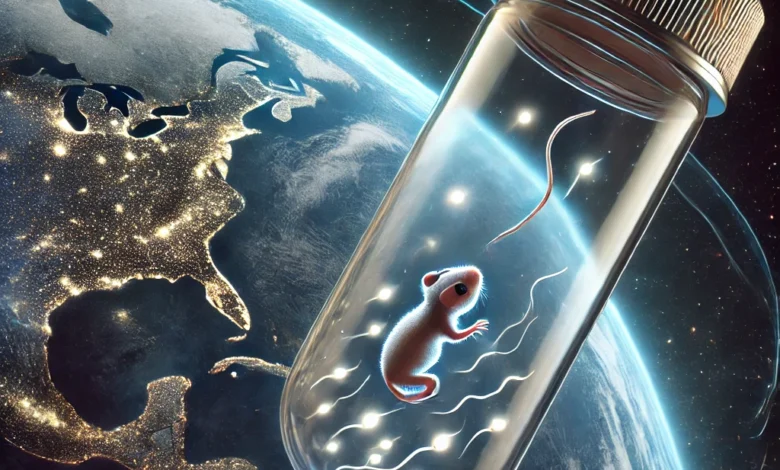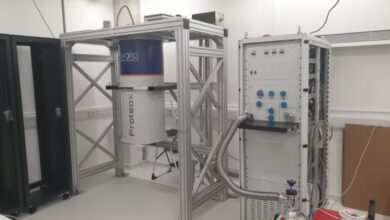Mouse Sperm in Space: Could Orbital Experiments Secure the Future of Humanity?

In a groundbreaking study that may hold the key to humanity’s survival in space, scientists have successfully tested the preservation and viability of mouse sperm exposed to Earth orbit. The experiment raises exciting possibilities for space colonization and reproductive biology beyond our planet.
The study, led by researchers from Japan’s University of Yamanashi and supported by the Japan Aerospace Exploration Agency (JAXA), explored whether sperm can endure the harsh conditions of space—such as microgravity and radiation—and still retain the ability to produce healthy offspring. The results, recently published in Nature Communications, could help answer a pressing question: Can humans reproduce in space?
The Space Sperm Experiment
In 2019, scientists sent freeze-dried mouse sperm samples to the International Space Station (ISS), where they remained for a period of six years in orbit. Stored in protective capsules, the sperm was subjected to the intense radiation of space and microgravity—two forces that could severely damage DNA and cellular function.
After the samples were brought back to Earth, researchers rehydrated the sperm and conducted fertilization experiments. To their surprise, the sperm remained largely undamaged. Healthy embryos were produced, leading to the birth of normal, viable mouse pups.
“This is a major milestone in space biology,” said Dr. Teruhiko Wakayama, the lead researcher. “We have demonstrated that sperm can survive long-term exposure to space radiation and microgravity, which is critical for future deep-space missions and colonization efforts.”
Reproduction in Space: Why It Matters
As humanity sets its sights on colonizing the Moon, Mars, and even farther reaches of the solar system, the ability to reproduce off-Earth becomes a crucial factor for long-term survival. Current missions focus on sustaining adult humans in space, but the next step involves growing populations to create sustainable colonies.
Radiation is one of the biggest challenges. Earth’s magnetic field protects life from harmful cosmic radiation, but space travelers are exposed to far greater levels. Scientists have long feared that radiation could damage reproductive cells, making natural reproduction—or even assisted reproduction—impossible during long-term missions.
This new study, however, suggests that freeze-dried sperm could bypass many of these risks. Unlike fresh sperm, freeze-dried samples are more resistant to DNA damage and can be stored without refrigeration, making them ideal for space transport.
Implications for the Future
The success of the mouse sperm experiment has opened the door to human applications. Scientists believe freeze-dried human sperm and other reproductive cells could be preserved in space for decades, offering an insurance policy for future generations.
“The implications go beyond space colonization,” explains Dr. Wakayama. “If we establish storage facilities in orbit or on the Moon, they could act as ‘backup banks’ for Earth’s genetic diversity in case of catastrophic events on our planet.”
Some experts envision a “space ark”—a facility orbiting Earth or stationed on the Moon—housing reproductive cells, seeds, and even DNA samples from humans, animals, and plants. This repository could safeguard Earth’s biodiversity and provide a foundation for off-world ecosystems.
Challenges Ahead
Despite the breakthrough, significant challenges remain. Reproductive processes in space, such as fertilization, pregnancy, and child development, are largely untested. Microgravity, radiation, and altered physiological conditions could complicate human reproduction and fetal development.
“This experiment is just the beginning,” said Dr. Sara Martinez, a reproductive biologist not involved in the study. “We still need to understand how these conditions affect embryos, gestation, and the long-term health of offspring born in space.”
A New Frontier for Humanity
As humanity pushes toward becoming a multi-planetary species, preserving life’s building blocks beyond Earth may be essential. The mouse sperm experiment offers a glimpse into a future where reproduction—and survival—extend into the cosmos.
“The question isn’t just can we live in space?” Dr. Wakayama concludes. “It’s can we thrive and create new life there? This research shows that with innovation and perseverance, the answer may very well be yes.”
With more missions planned to the Moon, Mars, and beyond, the prospect of humanity seeding life throughout the solar system has shifted from science fiction to scientific possibility. For now, mouse sperm floating in Earth’s orbit may hold the key to safeguarding the future of life as we know it.




